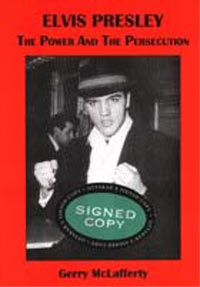The book, just over 230 pages, is very easy to read. The writer expresses himself in clear language, but sometimes enumerate a little too much. Still it never comes close to boring, but remains interesting to the end. A minor is the quality of the pictures; they are really poor quality prints of sometimes great shots, a real pity. The division of the book is quite unusual. It's not a chronological overview of his career, neither a real biography, what it claims to be in the summary on the back.
The first part, "Icon on trial" tries to clarify some (common) fallacies regarding Elvis' work and life and give some insight on the person Elvis Presley. At least we guess that is the intention, since it is not completely clear for what audience the book is written. To our knowledge it is not too widely available, but mainly in the "fan club circuit". Of course for most fans there is no need for clarification, but all different quotes (especially the positive ones) are a nice collection, disregarding most of them are well known and some very senseless (Mick Jagger), but that's not the author's mistake.
If the book is written for a more general audience, we are afraid the first chapter isn't working too well. Mainly because a lot of it sticks together like grains of sand and the author doesn't succeed in delivering a convincing view all the time, maybe because he tries to take (too much) distance. As a matter of fact, we (trying to ignore our opinion about the artist) have the feeling the negative and positive are balanced at best. The honest point of view from the author, who doesn't try to hide the negative, is admirable and he can't help Elvis' sometimes erratic behaviour is so overwhelming. But the description of it tends to stay longer in mind than the positive input by the author. Certainly with the artist Presley in mind, this can't be the intention.
The second part is about the music. It gives a good overview of the recordings, especially the achievements of them. Some nice facts are mentioned, especially about the British charts. So the average fan will gain some extra knowledge here. Sometimes the author skips from one subject to another, e.g. while writing about the "How Great Thou Art"-sessions and the fact that it took 14 years before "Beyond the Reef" was released as flipside of "It's Only Love" (in the UK), he spends twice as much space to show that it wasn't the only occasion that happened (pre Sun-recordings), before going on with the chronological overview.
Again, it depends a lot on the targeted audience, but the description of the American Sound Studio gives a real strange picture. We can imagine that when a non-fan is reading this book and gets interested in this 1969-work he or she will download some MP3's from the Internet. Knowing the hits he or she will skip to "Hey Jude", "From a Jack to a King", "Gentle on My Mind" and "It Keeps Right on A-hurtin'", "which were given a whole new interpretation by Elvis", according to the writer. Well, we can't disagree with that qualification and all depends on taste of course, but even a lot of fans think that especially the first two tracks are the weakest of the complete session. This same thing happens with the first Stax-session, where "Three Corn Patches" is even mentioned as being excellent, solely because Leiber and Stoller wrote it.
The third and the forth part of the book, respectively about "The Colonel" and Elvis' loneliness, give a bit of a feeling like "blame anyone but Elvis". We guess that's okay to most fans, but a general public would probably have its doubts about it. It is also a little in contradiction with the first part of the book, where the negative tends to get more attention. Nonetheless, those pages are filled with some nice quotes from different (known) people, and besides the "who to blame"-question it gives a good impression of a somewhat tragic life and the spoil of a tremendous amount of talent.
Looking back to the above review, it also gives a wrong impression on first sight, proving it is hard to express one's feelings. We certainly did enjoy the book and overall it is one of the better sketches of Elvis' artistic life. For hardcore fans there is little new information, for average fans we guess it is okay, but for a general public it might not be "convincing" enough. At the start of the second part the author shows the intention to tackle the common view on Elvis that he did some good things in the 50's, only poor movie-stuff in the 60's and was only able to entertain middle-aged audiences in Vegas during the 70's. Well, it looks like everybody except Ray Charles agrees on the first of the three, but we really doubt if the author convinced disbelievers of the opposite of the other two views. Well, that's their loss, we enjoyed it, both Elvis' work and the book and we guess a lot of fans (will) do too.
Elvis Presley - The Power and the Persecution by Gerry McLafferty
February 01, 2001 | Book